- Home
- Stephen L Carter
Emperor of Ocean Park eh-1 Page 17
Emperor of Ocean Park eh-1 Read online
Page 17
We let the silence envelop us for a while, escaping into our own minds. I am adding up all the hours of work I have waiting for me back home, secretly furious that I allowed Mariah to spook me into this trip. Everything the detective said made sense; and none of my sister’s theories are remotely plausible. I peek at my watch, hoping Mariah doesn’t see, and lift my mug to my lips, only to put it down fast. My hot chocolate tastes as bad as hers.
“Did you believe her?” Mariah asks, as though in contact with my thoughts. “Sergeant Ames, I mean? About Father Bishop?”
“You mean, do I think she was lying?”
“I mean, do you think she was right? Please don’t play word games with me, Tal, I’m not one of your students.”
I have to answer this carefully; I do not want to make my sister my enemy all over again. “I know what you meant,” I say slowly. “I think, if she isn’t right, then the alternative is that he was tortured because of… because of something to do with the Judge. But that doesn’t make any sense.”
“Why not?” Her question is sharp; again I must pick the right words.
“Well, let’s suppose-let’s suppose that there is some bit of information that the Judge took to his grave with him, information that somebody wanted. I don’t believe this, you understand, it’s just a supposition.”
Mariah gives a small, tight nod. I plunge on.
“Even if it’s true-even if there is some bit of information-well, I doubt that the Judge would have confided anything important in Freeman Bishop. I don’t mean to speak ill of the dead, but, come on.”
“Nobody who knew Daddy would think he would tell Father Bishop anything.”
“Nobody who knew Freeman Bishop would think the Judge would tell him anything.”
My sister rubs her womb again, protecting her baby. “So he wasn’t
… tortured… for information about Daddy, was he?”
“I don’t think so. If I thought anything else, I would grab my family and head for the hills.”
“If your family would go.” Mariah cannot help being mischievous when the subject of Kimmer comes up. I decide to ignore it.
“The point is, kiddo, the reason I think Sergeant Ames is right is that I can’t think of any reason that anybody would have… done those things to him.” I promised to protect you, and so I shall. I can repeat this mantra to myself, but reiteration does not make it feel true. Not completely. What feels true is that somebody is out there-Uncle Jack’s others -playing a very long game, waiting for me to do… well, whatever it is that everybody expects me to do. I sense no danger, but I sense no peace.
Mariah nods. “Neither can I,” she says. She runs a hand over her eyes. “She was really something, that detective. She was one tough lady.”
“Well, you got her to admit that the note was most likely a fake. …”
“Oh, Tal, give it a rest.” Mariah’s voice has gone unexpectedly hard. I have stumbled into her realm of expertise. “I didn’t get her to do anything. Cops don’t ever admit anything they don’t want to. She told us what she wanted us to know, and that’s all.”
“Well, that’s my point.” I am excited now. “She wanted us to hear all that stuff about drugs. Why? I bet the only reason she told us was that she doesn’t believe we’re going to keep it secret. She wants us to spread it around.”
“I never knew you were such a cynic.” Mariah shakes her head as though she has never been one. She shifts in her chair and her finger stabs toward me. “I liked Sergeant Ames.”
“But did you believe her about the drug dealers?”
“Well, they did find his car by the Navy Yard.”
“I bet there’s about a hundred fifty thousand people down in Southwest who don’t do drugs or sell them,” I preach.
“Give it a rest,” Mariah repeats. “Everybody knows Father Bishop does coke. Or he did, anyway. Everybody’s known for years.”
“Everybody knows what?”
“You’re so innocent, Tal. Why are you the last to hear everything?” She laughs. At least we seem on relatively good terms again. “You really don’t know?”
I shake my head.
“Well, it’s an old story. Laurel St. Jacques caught him snorting three or four years ago, right in the sacristy. You remember Laurel, don’t you? She married Andre Conway? I know you must remember Andre.” A devilish smile, reminding me that I am Kimberly Madison’s second husband. Andre was her first.
“I remember Andre,” I say quietly. I also remember-although I never mention it-an irrational fury at Andre after he won the first round in our battle for Kimmer Madison, including a moment, in his apartment, when we nearly came to blows. At that time he was a local news producer named Artis. His new appellation came when he decided to make documentary films. “I even remember he married Laurel.”
“Do you remember that they’re divorced?”
“Rings a bell somewhere.” I hope she is not hinting anything about Andre and my wife. Unbidden, my thoughts lead me down toward their usual obsessive fear: Andre is in Los Angeles these days, and Kimmer is often in San Francisco, and he could fly up to see her…
Oh, stop it!
“I heard there was another woman involved,” says Mariah, her old streak of cruelty unexpectedly manifesting itself.
“There usually is.”
Mariah glances at me, perhaps trying to figure out if I am putting her down with what she disdains as my Ivy League cleverness, as though she has none of her own. I keep my poker face on. “Well, anyway,” she finally continues, “Laurel caught Father Bishop at it a couple of years ago. And, Laurel being Laurel, she naturally told everybody. It’s a wonder he wasn’t fired on the spot. I think Daddy must have been off the vestry by then, or Father Bishop would have been gone. But they decided to keep him around. I guess they all must have felt sorry for him or something. You know us Episcopalians, Tal. We love to feel compassion for people. We’re never happy unless we’re ignoring somebody’s sins to show how tolerant we are,” adds my sister, who converted to Roman Catholicism in order to marry Howard and, Kimmer likes to say, has followed the Church’s teaching on birth control ever since.
“I didn’t know.”
“Well, it was quite the little scandal, Tal.” She flaps her hand for emphasis, tosses her head the way she used to when she wore her hair straight and long, then rushes eagerly on, happy for the chance to share gossip I seem to have missed. “Quite a few people left the church over it, as a matter of fact. The Cliftons left. Oh, they were furious! And Bruce and Harriet Yearwood left. Also Mary Raboteau. No, wait, she retired and went to Florida or something. I was thinking of Mrs. Lavelle-she’s the other one who left. And you’d think Gigi Walker would have left, she’s such a bluenose, but, well, I guess she had her reasons to stay.” An odd little laugh. My sister loves being judgmental, even when nobody else in the room knows what she is judging. “I can’t believe you didn’t hear about it, Tal.”
“No, I missed it.”
“Daddy thought Father Bishop should quit voluntarily, you know, save everybody all the trouble? But he went in front of the congregation and did one of those God-isn’t-finished-with-me-yet sermons, and that was pretty much the end of that. Oh, that reminds me.” My sister is on her feet. “I promised Sergeant Ames that I would call Warner Bishop. Poor guy, he doesn’t have anybody left.” Mariah vanishes into the foyer. A moment later I hear her tread on the stairs, going up to the study to find the Judge’s address book. I am amazed. I assumed that my sister was just talking when she said she would reassure Father Bishop’s family, but I forgot how seriously she takes promises. When we were children, she used to run to our parents to complain whenever I (or, more frequently, Addison) went back on a promise. In the Garland household, promise-breaking was pretty much a court-martial offense. Our mother would punish us, usually confining us to our rooms for a couple of hours, but our father would do something far worse: he would call us into the little downstairs study he used in those days and deliver o
ne of his excruciating lectures, letting the full force of his chilly, dispassionate disapproval wash over us as we stood before his desk at parade rest. Promises are the bricks of life, Talcott, and trust is the mortar. We build nothing in life if we make no promises, and we tear down what others have built if we make them and break them. Something like that. He struggled to make the same point to the Senate Judiciary Committee, explaining his relationship with Jack Ziegler: Friendship is a promise of future loyalty, loyalty no matter what comes. Promises are the bricks of life
… I will never abandon a friend, and I expect that my friends will never abandon me.
That’s a very noble sentiment, Judge, but the fact remains that this particular friend of yours was under indictment for…
With respect, Senator, it isn’t a matter of nobility. It’s a matter of what kind of world you want to build. If you want to build at all-or just to tear down.
Lots of friends did abandon him, of course, once they calculated that the Judge was more likely to wind up in prison than on the Supreme Court.
I go to the sink and wash our cups. When the water stops running, I hear Mariah’s voice drifting down the stairwell. Mariah, who can be warm and vivacious when she chooses, will probably be a considerable comfort to Warner Bishop, Freeman Bishop’s hapless son, now some kind of advertising executive in New York, with whom my sister once put in time in Jack and Jill and all the other youth groups of our set. Homely, chunky, awkward Warner Bishop, who wanted desperately to date Mariah when they were teenagers, but never quite succeeded in drawing her interest. According to Addison, Warner has carried a distant torch for her ever since. Oh, our closed little world!
“Drug dealers,” I mutter. Maybe, maybe not. Whoever it was, I do not even need to close my eyes to see the photos of what they did to Father Bishop. To his hand, to his thigh, and, easily imagined, to other parts of his anatomy that the detective chose, perhaps out of kindness, not to share.
Freeman Bishop, drug user, came to a drug user’s end. How is it that I alone seem not to have known?
Maybe Mariah is right. Or maybe she is nuts. Or maybe I am.
Maybe I should make a peace offering.
Drying my hands on a kitchen towel of hideous red-and-black design, I dither for a moment, wondering if it is time to use the card Jack Ziegler gave me in the cemetery. But it isn’t: after a murder, the last thing I need is to call in a monster for help. And then I know exactly what to give. The memory of my father’s lectures reminded me. I think Mariah’s hunt for a hidden clue will bear no fruit, but I do not want her to think I am her enemy. What I will offer is less a clue than a memento of the man our father was-a memento that might even persuade my sister to abandon her search. I stand up and head down the dark hallway to the claustrophobic first-floor library with its cherry cabinets. After a quick, covetous glance at the Miro, I sit behind the desk and roll the chair over to the bookshelf where my father kept his scrapbooks. I hunt through them for several minutes before giving up in puzzlement.
Mariah moved it, I am thinking. Or somebody else in the endless parade through the house after the funeral: Mariah’s children, Howard Denton, Just Alma, the unpronounceable au pair, Mrs. Rose, Sally, Addison, his little white girlfriend, Uncle Mal, Dana Worth, Eddie Dozier, the woman who cleans the place, one of the numberless cousins, anybody.
The blue album with the newspaper clippings of hit-and-run accidents is gone.
CHAPTER 11
A MODEST PROPOSAL
“Your wife and Marc Hadley are both up for the same judgeship,” Stuart Land informs me as soon as I am seated in his capacious chamber around the corner from mine.
“I think I know that,” I say, counterpunching but remaining respectful.
“In Europe, of course, this situation would be impossible.”
“Which situation?”
“They have a professional judiciary. You rise through the ranks. They consider rather unseemly the American system, under which… amateurs… may be appointed to an appellate court.”
“Well, we’re stuck with our system.” Although I am pretty sure my wife has just been insulted, I force a smile, not wanting to pick a fight with Stuart Land, the great Anglophile. I already have enough enemies around the building. “It’s worked out pretty well so far. No more than one scandal per decade.”
Stuart raises an eyebrow at my levity. Then he shrugs, as if to say responding to such nonsense is beneath his dignity. “Have you heard any news? About who might have the inside track?” Implying that my sources are better than his, which is unlikely. With the Republicans in the White House, Stuart probably could have had his pick of Washington jobs. Stuart Land, Lynda Wyatt’s predecessor as dean, and the man who persuaded me to return to my alma mater to teach, is among the most conservative members of our faculty. In the four years since his fall from power, Stuart has shown no signs of bitterness toward Lynda or Marc Hadley or Ben Montoya or Tish Kirschbaum or any of the several other professors who conspired to oust him. He continues to crisscross the country in search of money for the law school, and our alumni, especially the older, wealthier ones, love him still and continue opening their wallets and checkbooks when Stuart calls. Indeed, many still refer to him as “the Dean,” maybe because it once seemed he would hold the job until he died, and if Lynda is envious of their affection, she hides it well.
It is not possible to get close to Stuart, although the more conservative professors hang around with him, and Lemaster Carlyle, who seems to get along with everybody, is a pal. As for myself, I will confess that I have never quite liked Stuart. But I have always admired him, not least because he was the only member of the faculty actually to testify in favor of my father’s confirmation to the Supreme Court. His integrity, moreover, is beyond question, which is why I was surprised and a little disturbed when he called me up just days after my return from Washington to suggest that I drop by for a chat.
Having nothing better to do at nine in the morning but sit in my office and feel sorry for myself, I agreed.
Stuart Land is a fussy little man whose vested suits with their pinstripes and broad lapels might be described as gangsta-like, except that he is white and crew-cut and somewhere north of sixty. His face is round and utterly without affect, his eyes are pale gray and glittering with fierce intelligence, and the half-glasses always perched on his nose make him look more censorious than professorial. His prim mouth is always ready with a word of sharp, witty disapproval. Nobody takes to him on first meeting, or second, but, somewhere along the way, a certain charisma emerges, and few of our students, even those on the left, manage to leave the law school without sharing in that general warm glow that everybody feels toward him.
This morning, however, Stuart is neither warm nor glowing. He exudes no charisma. He called me because he has a point to make, and, in true Stuart Land fashion, he chooses to make it through a series of gentle, indirect, yet very pointed assaults-the same style he uses in the classroom, and with which I was skewered more than once in the days when he taught me contracts.
“No, Stuart,” I report dutifully. Half my attention is still focused on Washington, where Mariah, unable to reach Warner Bishop, left him a message. I said nothing to her about the missing scrapbook. “We haven’t heard any news.”
“Neither has Marc. I gather he’s quite upset about the whole thing.”
“I’m sorry to hear that.” Which is vaguely true.
“Marc isn’t a bad fellow, Talcott. You just have to get to know him.”
“I don’t have anything against Marc. I like him.”
Stuart frowns as though suspecting a lie. He drums his fingers. “He hasn’t been the scholar we hoped for when we hired him, of course. That writer’s block. But he really is a fine colleague, Talcott. A wonderful teacher. A brilliant mind. And, you know, when we hired you, Marc was one of your keenest backers.”
“I… had no idea,” I say truthfully. Unlike some law faculties, ours makes a fetish of confidentiality, an
d talking to people about who voted for or against them is considered to be somewhere between unethical and outrageous. Still, I have heard that Theo Mountain was my biggest booster, and during my first few years on the faculty, he and I were quite close. He was never quite my mentor-I have never really had one-but, until my father’s hard march to the right turned Theo into a carping critic, the two of us spent a lot of time together. Stuart Land, then the dean, was the man who actually persuaded me to quit the practice of law and come up to Elm Harbor to give teaching a try. He caught me at a good time: Kimmer and I were in the midst of one of our many estrangements. That she followed me to this city nine months later, and married me into the bargain, surprised me almost as much as it did our friends and families. And I have always wondered-although both parties deny it-whether Stuart might also have been responsible, somehow, for persuading my wife that the practice of law in Elm Harbor was not the hick job she imagined.
“Marc is a good man,” Stuart repeats. “As your wife is a good woman.”
“Yes,” I murmur, taking mental exception to the comparison as I wait patiently for the rest. Stuart has asked me here for a reason, and I know he is about to tell me what it is. I do not, however, have much energy to spend worrying about Marc Hadley’s feelings just now, even if he did back my appointment. The murder of Father Bishop, hard on the heels of the death of the Judge, has pretty much drained my wellspring of sympathy. Two nights of argument with Kimmer, whose position is still that there is nothing to worry about, exhausted the rest of my emotional self. Yet the main point I made to Stuart is correct: I do kind of like Marc Hadley, who is not much liked around the building. Marc, who has been teaching jurisprudence at the law school for eighteen years, is actually a fairly nice man. His son Miguel is one of Bentley’s best preschool buddies, so we see Marc and his second wife, Dahlia, socially in the way that parents do: in the school parking lot, at birthday parties, on field trips to the fire station around the corner. We are not exactly intimates, Marc and I, but we always used to get along. And although Dear Dana considers Marc “overreputed”-a famous Worthism-he is, in my judgment, every bit as brilliant as his legend insists; it takes only a minute or two in his presence to sense that fantastic brain pulsing forth its great ideas. But if his intellect is one legend, his inability to produce any scholarship is another. His academic standing rests on his single book, published quite early in his career. He has published almost nothing since. He seems to have read every book ever written, on every subject, and is ready with a quotation for any occasion, but Marc himself suffers from one of the great writer’s blocks, a true monster of the species, and there are law reviews everywhere still waiting for articles he promised a decade ago. For a startling moment, I find myself sympathizing after all with Marc, who probably feels he needs the judgeship to prove his career has not been a waste. Then I shrug it off and am ready to fight for my wife again. “Two good people,” I echo, just to show I have not lost my place.

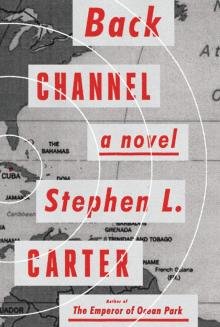 Back Channel
Back Channel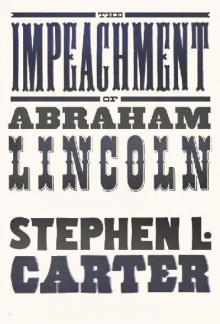 The Impeachment of Abraham Lincoln
The Impeachment of Abraham Lincoln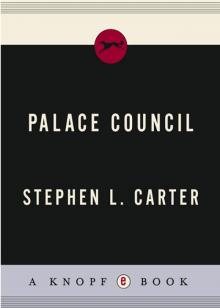 Palace Council
Palace Council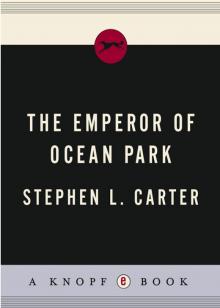 The Emperor of Ocean Park
The Emperor of Ocean Park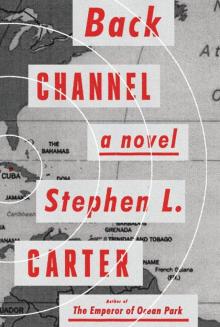 Back Channel: A novel
Back Channel: A novel Emperor of Ocean Park eh-1
Emperor of Ocean Park eh-1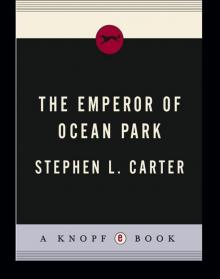 Emperor of Ocean Park
Emperor of Ocean Park